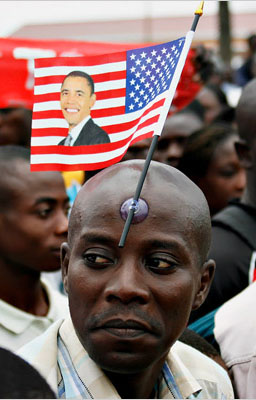 Let’s grade Obama’s speech in Ghana on Saturday, July 11 relative to findings from the academic literature on aid & Africa. This is conveniently self-promoting as the current issue of the Journal of Economic Literature has a long literature survey article by yours truly, “Can the West Save Africa?” (Ungated version of the entire article here.) Of course, this is MY particular take on the literature, but it had to satisfy some hypercritical referees and editors who had no agenda.
Let’s grade Obama’s speech in Ghana on Saturday, July 11 relative to findings from the academic literature on aid & Africa. This is conveniently self-promoting as the current issue of the Journal of Economic Literature has a long literature survey article by yours truly, “Can the West Save Africa?” (Ungated version of the entire article here.) Of course, this is MY particular take on the literature, but it had to satisfy some hypercritical referees and editors who had no agenda.
“Africa’s future is up to Africans.”
A+. This is the big message of Obama’s speech and he nailed it. No, the West cannot save Africa. The JEL survey reviewed disappointments of the Big Push of foreign aid, structural adjustment, governance assistance, and post-conflict reconstruction, which makes it clear that Western actors do not have the knowledge or power to transform African societies, even if West can do some modest things to help African individuals (where there has already been success, especially in health and education).
“What we will do is increase assistance for responsible individuals and
institutions, with a focus on supporting good governance …. concrete solutions to corruption like forensic accounting, automating services, strengthening hotlines, and protecting whistle-blowers to advance transparency and accountability.”
B. On plus side, nice modesty of aid ambitions. On the minus side, seems to imply bad governance can be corrected with technical fixes, which overlook the systemic incentives that motivate the bad guys (as JEL lit review makes clear). Also assumes outsiders can tell good guys from bad guys, and surgically isolate them.
“Our $3.5 billion food security initiative is focused on new methods and technologies for farmers.”
C. Those who forget the past are condemned to hear a Santayana quote. The JEL survey makes clear the great efforts already expended on “new methods and technologies” for African agriculture (some going as far back as 1938), along with the universal agreement among observers that these efforts failed. Next step is to learn from this failure, try something new, not just repeat past attempts.
“Yet because of incentives – often provided by donor nations – many African doctors and nurses …work for programs that focus on a single disease. This creates gaps in primary care and basic prevention.”
A+, Obama nails another one. JEL survey makes clear the collapsing payoffs to the “vertical” approach to health (focusing on diseases rather than patients.)
“We welcome the steps that are being taken by organizations like the African Union and ECOWAS to better resolve conflicts, keep the peace, and support those in need. And we encourage the vision of a strong, regional security architecture that can bring effective, transnational force to bear when needed.”
D. Sigh. Obama seems to fall for the myth of the benevolent, neutral, outside, rapid-response “peacekeepers,” which is a leap of faith relative to the historical record that outside military intervention is rarely neutral and rarely available rapidly “when needed” (JEL article). Any given African country will not automatically see an outside force as neutral just because it is made up of other Africans.
“our Africa Command is focused not on establishing a foothold in the continent, but on confronting these common challenges to advance the security of America, Africa and the world.”
F. Double sigh. Why is Obama continuing Bush’s terrible idea of an Africa Command? Despite goodwill for Obama, goodwill for US military is nonexistent after a long history of Cold War Africa interventions, post-Cold War interventionist fumbles, reinforced by the more recent fiascos of Iraq and Afghanistan. Africans will never see US military (or any other Western force) as a neutral and benevolent force. They understand Great Power incentives better than the Powers themselves seem to.
“You can … make change from the bottom up…Freedom is your inheritance. Now, it is your responsibility to build upon freedom’s foundation. And if you do, we will look back years from now to places like Accra and say that this was the time when the promise was realized – this was the moment when prosperity was forged; pain was overcome; and a new era of progress began. This can be the time when we witness the triumph of justice once more. Thank you.”
A. Obama returns at the end back to his central idea. The speech seems written by different people with different views, which I’m sure it was. Let's hope the other advocates lose out to this closing inspiration of Bottom Up efforts of creative, free individuals -- contradicting the Top Down ideas like military intervention or expert fixes for corruption or agriculture -- hopefully the view closest to Obama’s personal vision.
 From Aid to Equality
From Aid to Equality

 This teachable moment is not only about race. It includes understanding why the Cambridge MA police department would arrest Skip Gates for breaking into his own home, and then continue to insist after a huge outcry that they did the right thing.
This teachable moment is not only about race. It includes understanding why the Cambridge MA police department would arrest Skip Gates for breaking into his own home, and then continue to insist after a huge outcry that they did the right thing.



 Last season, when the British soccer team Liverpool FC played Real Madrid, the number of Spanish players in Liverpool’s team outnumbered those playing for Madrid. This is one illustration of an emerging trend: while soccer is already the most globalized of sports, it is also fast becoming one of the most globalized professions.
Last season, when the British soccer team Liverpool FC played Real Madrid, the number of Spanish players in Liverpool’s team outnumbered those playing for Madrid. This is one illustration of an emerging trend: while soccer is already the most globalized of sports, it is also fast becoming one of the most globalized professions. Let’s grade
Let’s grade  During the G8 meetings, Pope Benedict released a
During the G8 meetings, Pope Benedict released a 
